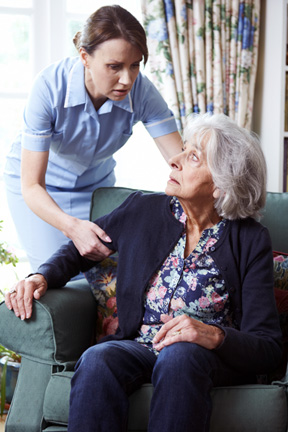Free Case Evaluation
You will never be charged a fee unless a recovery is made for you.
Did you or someone you love sustain a physical injury or illness that required treatment and/or hospitalization while receiving assisted care in a nursing home or licensed care facility or while being cared for by a licensed in-home care professional? Do you suspect it was due to abuse or neglect?
The elderly and disabled can be so vulnerable. When they are abused, it is particularly despicable and sad. Nursing homes, personal-care homes, other licensed care facilities, and in-home aides all have a duty to provide a certain standard of care and to treat their clients with respect and dignity. When they do not, it’s appropriate to consult with an assisted-care abuse attorney to hold the organization accountable and to prevent further abuses.

If you or your loved one has suffered a physical injury or illness requiring treatment and/or hospitalization while at an assisted-care facility or while receiving care at home and you suspect it was the result of abuse or neglect, call us at 800-796-1636 or submit your case details online and someone will contact you shortly. You pay nothing unless your lawsuit is successful and you receive compensation.
At Trustwell Law, our experienced attorneys take a personalized, compassionate approach. We cut through the legalese and partner with our clients. We have access to the expertise, resources, and manpower to fully investigate each case and fight for and with our clients to get the justice they deserve.
Common signs of assisted-care abuse include:
It is not uncommon for an older or disabled person being abused to be too embarrassed, ashamed, or disgusted to report their mistreatment. So, it is very important for their loved ones to take any signs of mistreatment seriously and consult a lawyer to investigate.
Nursing homes, licensed care facilities, and professionals employed to help older or disabled people are expected to meet certain standards of care. When they do not, and negligence or abuse results, they should be held accountable.
Potential issues leading to assisted-living abuse and harm to patients include:
Assisted-living abuse lawsuits may result in compensation for:
In some unusual cases, punitive damages may also be awarded.
If you or your loved one has suffered a physical injury or illness requiring treatment and/or hospitalization while in a nursing home or licensed care facility or while being cared for by a licensed in-home care professional and you suspect it was due to abuse or neglect, contact us.
Sources
Acierno R., et al. (2010, February). Prevalence and correlates of emotional, physical, sexual, and financial abuse and potential neglect in the united states: the national elder mistreatment study. Retrieved from https://www.ncbi.nlm.nih.gov/pmc/articles/PMC2804623/#:~:text=One%2Dyear%20prevalence%20was%204.6,neglect%20in%20the%20past%20year
Burnes, D., et al. (2015, September). Prevalence of and risk factors for elder abuse and neglect in the community: a population-based study. Retrieved from https://pubmed.ncbi.nlm.nih.gov/26312573/
National Center on Elder Abuse. (n.d.). Statistics and Data. Retrieved from https://ncea.acl.gov/What-We-Do/Research/Statistics-and-Data.aspx
You will never be charged a fee unless a recovery is made for you.